
Known for keeping those at the very top-end of climbing in good working order, helping those at much lower levels to get to the root of whatever issues might be plaguing them, and establishing his own hard climbs in and amongst it all, Paul 'Huffy' Houghoughi knows a fair bit about the world of climbing and what it demands of the body.
During a consultation earlier this year for some unhappy PIP joints (much better now - thanks!) Huffy mentioned that he'd decided to bite the bullet and set up his own practice. I thought it would be a great opportunity for us to look over a bit of his climbing history, and to learn more about the road that led him to where he is now, so asked if he'd be happy to do an interview with UKC about it all - and here it is!
Can you tell us a little bit about how you first encountered climbing, and what it was about climbing that got you hooked?
My earliest memory of climbing is scrambling up the north face of Tryfan with my grandfather.
I would have been about twelve years old, and I remember him showing me a rock-over which he called an 'extreme manoeuvre'. I spent about ten minutes figuring my way up this single cruxy move, and still remember how happy I felt standing on the handholds.
You've put up a number of hard, high-quality first ascents over the years - which of the boulders you've established do you think of most fondly?
Off the top of my head today:
Will (V11), Mallory Boulder, North Wales, 2004.
Climbed in memory of Will Perrin who did the FA of Mallory Crack in 2001. I climbed a lot with Will growing up and memories of his antics still make me smile today.
A Moment in Time, Rocktown, PA, 2006.
Still one of the best lines I've ever climbed. It felt really hard at the time, and I've never seen anything about it online since!
You Can Go Now (f8B), The Cuttings Boulderfield, Dorset, 2017.
Climbed during a busy time in my life. I chose not to use the big toe hook as a personal challenge. Nine months of failure on that thing taught me more about myself than any success I've had over thirty years in climbing.
Jonny Kydd projecting, and making the second ascent of, You Can Go Now.
Are you able to find the time to climb much at the moment? If so, what do you tend to get up to on a normal climbing day?
Not as much as I would like, to be honest. Family life then work are currently taking priority. I climb two times a week at the moment, usually just indoors on a board for 60-90 mins, with two sessions a week fingerboarding with some basic weight lifting.
It's enough to maintain a level, but I'm definitely looking forward to returning to a form I'm happy with on rock. There are still a few pretty hard first ascents left to do on Portland!
When did you start becoming interested in physiotherapy?
When I was fourteen I tore my right lat really badly and couldn't do a pull up for a year. My mum took me to a physio really regularly for weeks, and they helped me learn to use and trust my shoulder again.
I guess I never forgot what she did for me, and ever since I've made a point of appreciating the freedom of moving without pain or restrictions. I love the fact I can earn a living helping others to do the same.
As you continued your physiotherapy training, how did your understanding of the body and how it functions begin to inform your own training and climbing?
I've been very fortunate to have a body that feels naturally strong and resilient, which served me well through more than thirty years of hard training in climbing and other sports like submission grappling. It's only in the last five years that I have needed to treat my body with more respect, with a focus on finding ways to remain resilient, albeit with a more structured approach.
I don't think we know how long it is possible to maintain a high level of personal performance in climbing, and I'm definitely not interested in imposing arbitrary restrictions on it just yet!
You work with a wide range of clients, covering professional climbers, footballers, runners, and musicians - as well as regular folk! - throughout all of these varied individuals, what is it that makes a particularly interesting case for you as a physio?
It's always about individual motivation. Humans are fascinating, and the more someone trusts me to help them reconnect with what motivates them, the more rewarding the process is.
In terms of climbing specifically, you work with both recreational climbers and pros competing at the highest level - what are the main differences that you see when treating elite athletes compared to those of us who are slightly less structured with our training?
So many of the people I have worked with on an elite level have an intangible grit that allows them to suffer more both mentally and physically than the average person. It's an impressive quality, which can be equally damaging when things are not going well.
Because there is so much more invested for a full time athlete, difficult times require quiet calm confidence in your own skills and a lot of trust between you and the athlete, both of which take time to develop.
Tell us about working at the Olympics - what's your role as a physio when you're at the games? Are you there watching, ready to jump into action at any given moment? Are competitors allowed treatment during the rounds? Does most of your work happen before or after the rounds? Give us an insight into what your time in Paris looked like!
Ideally, most of the work is done weeks before the competition even starts. With a competition as big as the Olympics, I've usually got a very structured plan around any problems that an athlete is carrying, with agreed plans between coaches on training specifics, and kit on standby at places like the GB Performance Lodge on training days and in-between rounds. On the World Cup circuit a lot of the work is done in the isolation/warm up zone behind the actual comp wall, or in the hotel room with coaches present.
During the competition, I'm allowed to see the athletes in the field of play as soon as they signal that they need me. Medical time-outs happen with an official present who makes sure I only assist with the injury, without providing additional information that might give the climber an advantage in the competition, like beta or letting them know how many points they might need to qualify or win.
How does being a team physio change your experience as a viewer? Do you find yourself reading routes/boulders with your climber's injuries/weaknesses in mind?
It's a very difficult role. I know a lot of the physios on the World Cup circuit very well, and we all walk a line of caring intensely about the climbers we work with, whilst having to not be emotional in the moment as that doesn't help anyone.
I often read World Cup blocs through the lens of mechanical stress rather than physical performance, which is very different to the mindset of an athlete and coach.
Are there any general attitudes or approaches to climbing that you think would help most climbers to avoid injury?
Warming up is very important as a rule. I definitely don't do it regularly, but would encourage others to find a routine which works for them so they can get a better idea of how they're feeling on any given day. Pros do this really well.
Climbers are great at pushing themselves, but are generally pretty terrible at resting enough. Nowadays there is better awareness of the importance of sleep and fueling properly, but something I don't hear many people talking about enough is resting. Training stimulates adaptation, but rest allows a protected recovery time in which adaptations can take place. It's such an important aspect of training which I think gets overlooked, particularly with fingers/finger strength.
In my own experience, one of the hardest things about rehabbing an injury is the psychological side of things and staying consistent. Even if the physical exercise is manageable, sticking to the protocols long enough to see the benefit can be a real challenge! How do you incorporate the psychological side of things into the rehab protocols that you put together for people?
The technical aspect of figuring out what is injured always fascinates me, but if I can't suss out why it happened in the first place it's not much good to anyone.
Being able to clearly articulate what is causing the problem, and more importantly why it happened in the first place, or why it continues to be a problem, is essential for someone to be on board with any plan.
The more confident you are with the 'why?', the less complicated any rehab plan should be. From there, it's about managing expectations, and providing time frames and measurable steps to gauge progress. I set myself this challenge each and every time I work with someone.
You've recently set up your own clinic, can you tell us a bit more about that, and how it's all going?
When got back from the Paris games I decided to focus on improving my work life balance, which I initially failed miserably at, ending up working more than ever! I decided it was time to back myself 100% and quit all employed work to start my own company, offering remote and in-person physio, as well as mentoring and workshop CPD, which are all available via my website.
I'm still less than two months into this new phase of my working life, which has gone better than I could ever have imagined. I'm incredibly grateful to the people I work with, and to climbing in general, for the support they've shown me, and for the trust they have in my work.
- REVIEW: Ocun Diamond S - Precision and power for steep boulders 8 Aug
- REVIEW: Black Diamond Circuit Z Bouldering Mat 6 Jun
- REVIEW: Scarpa Drago XT - One Drago to Rule Them All? 8 May
- SKILLS: What gear do you need for bouldering outside? 6 Mar
- REVIEW: Rab Kangri Gore-Tex Paclite Plus Jacket 10 Feb
- FEATURE: Climbing Archive: The Stone Circle 24 Dec, 2024
- VIDEO: Josh and Jack Ibbertson - Climbing as Kids, Redpointing in the UK, and Flatanger 3 Dec, 2024
- VIDEO: PREMIERE: The Risk Business | Chasing Pete Whillance 29 Nov, 2024
- INTERVIEW: One year later: Alex Waterhouse and Billy Ridal look back on their ascent of The Nose 8 Nov, 2024
- SKILLS: Push Your Grade: How to Climb Your First 7A Boulder 24 Oct, 2024

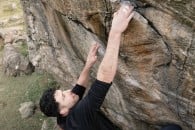







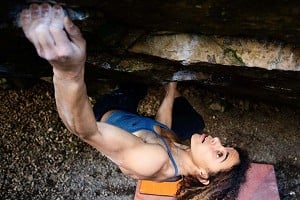
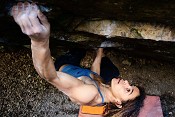
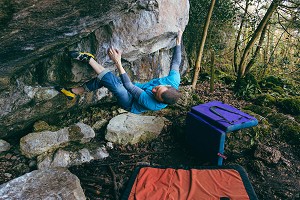
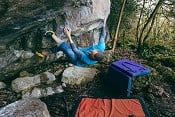








Comments
I largely blame Paul for the recovery of a finger injury that has been on and off for me for years and therefore my subsequent climbing of my first 8a (or 7c+ depending on who you ask).
Can't recommend highly enough!